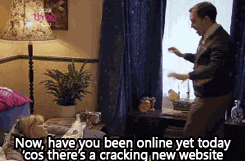Lost in translation? BBC Three makes the move online

Last week BBC Three downed tools and officially made the switch to digital only channels – but will the audiences follow?
This month has heralded a shift in medium as both the The Independent and BBC Three made the permanent move into the virtual world. We have already debated whether this new platform will spell the end for print, but what does this mean in the world of TV?
The announcement came as a blow to those of us who loved the channel for its witty and fresh comedy programmes, and as the home of hit favourite sitcom Gavin and Stacey. However it’s hard to argue with the reported £30 million saving the company will make by the move. The BBC Trust are adamant that there’s, “clear public value in moving BBC Three online, as independent evidence shows younger audiences are watching more online and watching less linear TV”.
The move aligns the BBC with prominent online providers such as the ever popular Netflix and Amazon Prime. Certainly, BBC Three would do well to copy of Netflix – the incredibly fast growing subscription service which has almost monopolised the online market. Netflix attributes its success to a close tracking of content watched – and responding by giving audiences what they want.
But the 16-24 target market of BBC Three is fickle – with the younger generation a notoriously flighty audience to attempt to capture. With a predicted a fall of 3.5% in audience figures, the shift is still a risk.
However the main problem with taking BBC Three online is the drastically reduced budget available compared to their online competitors – which will ultimately affect the content they are able to create. It will be extremely difficult to compete with the multi million budgets available to Netflix and Amazon Prime with their blockbuster quality series.
But is the move online all doom and gloom? Hopefully, it will spark fresh ways of making content and open opportunities for young production talent. A lower budget will also mean that the channel will need to invest in emerging names, giving rise to a new pool of creative talent.
As always – quality content is king. But can BBC Three do battle with these well established rivals? They need to find their niche or risk being lost in translation.



